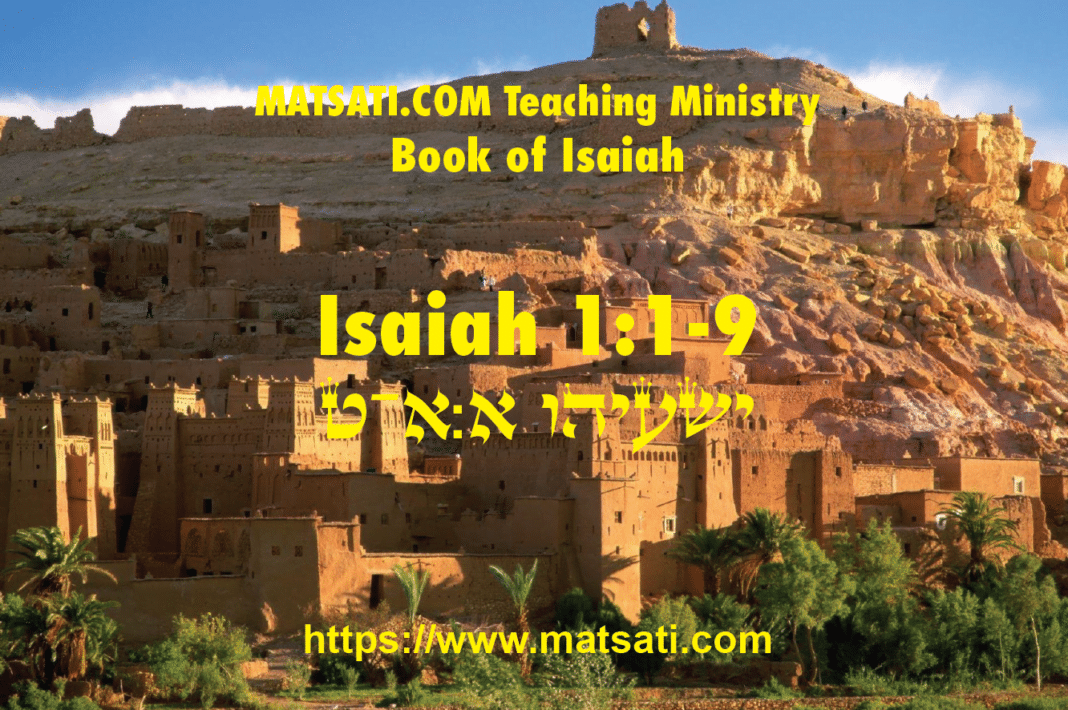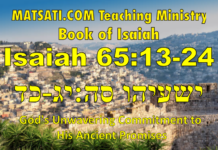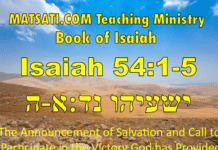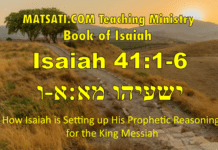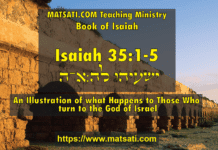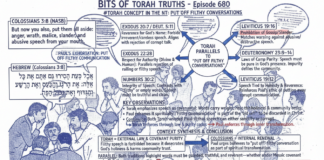Table of Contents
Introduction to Isaiah 1:1-9
In preparation for this study, reading through commentaries on Isaiah, generally the discussion on Isaiah begins with the placement of the first 5 chapters before chapter 6. The idea is the events of chapter 6 may have occurred prior to chapters 1 through 5. The belief is that those who edited the book of Isaiah purposely placed the first five chapters before chapter 6. The difficulty is that chapter 6 is intimately connected to chapters 7 through 9,and so if chapters 1 through 5 are placed between chapter 6 and 7 this creates quite a disruption in the flow of the narrative. Chapters 1 through 5 however are a powerful, though general, statement of the hopes and realities of Judah’s sinful situation. It is important to note that the Isaiah text that we currently have, coupled with the discovery of the dead sea scrolls placing that copy back to the first century BC are identical. The lifespan of Isaiah was between 740 BC and 686 BC, placing the time difference between 500 and 600 years of Isaiah’s life. If the text was redacted it would have occurred within this time period. Knowing the meticulous approach the soferim took to copy the text and not alter it, it is the belief of this author that the book of Isaiah maintained its current form and the chapters were not moved around based upon alternative theories related to chapter 1 through 5 and the beginning of Isaiah’s ministry in chapter 6. In this study we will also assume that Isaiah is the author of all 66 chapters of the book of Isaiah.
In the Hebrew Bible, the text is typeset with the letter פ and ס. The פ (Hebrew letter peh) stands for the Hebrew word “petuchah,” that is, “open.” The ס (Hebrew letter samekh) stands for the Hebrew word “setumah,” that is, “closed” or “blocked.” This indicates sections within the Hebrew text of the book of Isaiah.

ספר ישעיה פרק א
א חֲזוֹן יְשַׁעְיָהוּ בֶן-אָמוֹץ אֲשֶׁר חָזָה עַל-יְהוּדָה וִירוּשָׁלָם בִּימֵי עֻזִּיָּהוּ יוֹתָם אָחָז יְחִזְקִיָּהוּ מַלְכֵי יְהוּדָה:
Isaiah 1:1
1:1 The vision of Isaiah the son of Amoz, which he saw concerning Judah and Jerusalem in the days of Uzziah, Jotham, Ahaz, and Hezekiah, kings of Judah. (KJV)
תרגום יונתן בן עוזיאל אל ישעיה פרק א:א
נְבוּאַת יְשַעיָה בַר אָמֹוץ דְאִתנַבִי עַל אְנָש יְהוּדָה וְיָתְבֵי יְרוּשלַם בְיֹומֵי עֻזִיָה יֹותָם אָחָז יְחִזקִיָה מַלכַיָא דְבֵית יְהוּדָה׃
Targum Jonathan son of Uziel Isaiah 1:1
1:1 The prophecy of Isaiah, the son of Amoz which is prophesied concerning the men of Judah and the inhabitants of Jerusalem, in the days of Uziah, Jothan, Ahaz, and Hezekiah, the kings of the house of Judah. (Targum Jonathan)
The first verse in Isaiah from the Masoretic text opens saying חֲזוֹן יְשַׁעְיָהוּ בֶן-אָמוֹץ. The word חֲזוֹן written in the common, singular, construct form, from the root word חזה meaning “vision,” or “word of revelation.” We are being told this is an oracle, or vision of the prophet Isaiah. The Targum translates this as נְבוּאַת יְשַעיָה בַר אָמֹוץ using the word נבא “prophet” where נְבוּאַת means “prophecy.” These opening words identify Isaiah as a prophet from the beginning. This is similar to what we see for these other Prophets: Ezekiel, Jonah, Haggai, and Zechariah. Based on the first word in the book (חֲזוֹן) Isaiah titles the entire book as a vision which is unique, except for Obadiah the Prophet. The root ḥzh, when it denotes physical sight, suggests intensity (Isaiah 33:20, 57:8). More frequently, it denotes something like insight or perception. Thus it is sometimes used in theophanic settings (Shemot / Exodus 24:11, Job 19:26-27, Tehillim / Psalms 11:7, 17:15, etc.) and indicates the prophet’s awareness of the true meaning of things.
The meaning of the name Isaiah (יְשַׁעְיָהוּ) means “Yah Saves” meaning that it is God (YHWH) who saves. Isn’t this an amazing name for a prophet who speaks to the people in a time like this? HaShem judges and destroys, He also brings salvation by the power of His right hand! The text describes Isaiah as בֶן-אָמוֹץ (son of amoz) note that this is Amoz, and not Amos. Thus, Isaiah is not the son of the prophet Amos. Jewish tradition teaches that Amoz is the brother of king Amaziah, the father of Uziah, making Isaiah of royal blood. Isaiah’s access to the kings during his ministry may be evidence that this may be true, however, both Elijah and Elisha previously had spoken freely to kings so this can’t be used as a proof for his royal descendancy. Verse 1 goes on אֲשֶׁר חָזָה עַל-יְהוּדָה וִירוּשָׁלָם בִּימֵי עֻזִּיָּהוּ יוֹתָם אָחָז יְחִזְקִיָּהוּ מַלְכֵי יְהוּדָה “which he saw concerning Judah and Jerusalem in the days of Uzziah, Jotham, Ahaz, and Hezekiah, kings of Judah.” Here, Isaiah provides geographical identification and time-frame, Jerusalem and Judah, and in the days of these kings, respectively. Note that his geographical location of Jerusalem and Judah did not restrict his prophecies to only these regions. For example, Ephraim mentioned in Isaiah 28:1 is the Ephraim who has threatened the Holy City (Isaiah 7:1–2). Also, the Babylon to whom Isaiah speaks is typical of that vaunting human pride from which God has promised to deliver his own (Isaiah 11:12).
ספר ישעיה פרק א
ב שִׁמְעוּ שָׁמַיִם וְהַאֲזִינִי אֶרֶץ כִּי יְהֹוָה דִּבֵּר בָּנִים גִּדַּלְתִּי וְרוֹמַמְתִּי וְהֵם פָּשְׁעוּ בִי: ג יָדַע שׁוֹר קֹנֵהוּ וַחֲמוֹר אֵבוּס בְּעָלָיו יִשְֹרָאֵל לֹא יָדַע עַמִּי לֹא הִתְבּוֹנָן:
Isaiah 1:2-3
1:2 Hear, O heavens, and give ear, O earth: for the LORD hath spoken, I have nourished and brought up children, and they have rebelled against me. 1:3 The ox knoweth his owner, and the ass his master’s crib: but Israel doth not know, my people doth not consider. (NASB)
In verse 2, Isaiah’s words remind us of Parashat Haazinu (פרשת האזינו) which states in Devarim / Deuteronomy 32:1, א הַאֲזִינוּ הַשָּׁמַיִם וַאֲדַבֵּרָה וְתִשְׁמַע הָאָרֶץ אִמְרֵי-פִי “Give ear, O heavens, and I will speak; hear, O earth, the words of my mouth.” These words are the opening words to the song of Moshe in the Torah to Israel just before Moshe’s death and prior to their entering into the Promised Land. In the Torah, there are at least three songs that Moshe wrote. One was sung after the crossing of the Red Sea (Shemot / Exodus 15), one is recorded in Tehillim / Psalm 90, and the other was written in the last days of Moshe’s life, in Devarim / Deuteronomy 32. The song begins with a universal call to listen, followed by praise of the just, faithful, and upright God (Devarim / Deuteronomy 32:1-4). In contrast to God’s faithfulness Moshe writes about Israel’s unfaithfulness (verses 5-6). The song proceeds to recite the history of Israel from her time of bondage in Egypt, through their wilderness wanderings, to her established place in the Promised Land (verses 7-14). The Song of Moshe then becomes prophetic as God speaks through Moshe about Israel’s future, ingratitude, and idolatry are predicted, as are the judgments of God for her sins (verses 15-31). Then God promises to avenge Israel against Israel’s enemies, showing compassion to His people (verses 32-42). The song ends on a joyful note, as God’s punishment is past, righteousness is restored, and the land of Israel cleansed (verse 43). A major theme of the Song of Moshe is God’s faithfulness. He is called “the Rock” four times in the song (Devarim / Deuteronomy 32:15, 18, 30–31). Even as God’s people are chasing whims and trusting false gods, God remains their steadfast, unchanging Source of Salvation. The last words of the Song of Moses are a promise that God will “make atonement for his land and people’‘ (Devarim / Deuteronomy 32:43). This is a significant promise, as we know today through the lens of history how atonement for God’s people was brought through His Son Yeshua the Messiah. (Colossians 1:20). In these two verses (Isaiah 1:2-3), Isaiah summarizes the song of Moshe very succinctly in verse 2 describing the faithfulness of God, “I have nourished and brought up children, and they have rebelled against me.” And in verse 3 what we see in nature “The ox knoweth his owner, and the ass his master’s crib” and the wilful people who choose not to seek the God of Israel, “but Israel doth not know, my people doth not consider.” Due to Isaiah linking to Parashat Haazinu, we can see how Isaiah is speaking clearly of the covenant that underlies the foundation of Israel’s relationship with God. The covenant however has been broken and its curses fallen upon the people, as Isaiah in his book predicts and appeals to the people for repentance and turning from their sins. Isaiah does not literally use the word ברית for covenant, however his particular phraseology suggests this link to Haazinu and the son of Moshe. The significance of this is revealed when we think about the reason for living. The Torah was given so that God’s people would understand what God expects of them, the pattern of living in righteousness, holiness, truth, and justice, without which life could not be sustained in the Land. Remember, the Torah was not given as a means for earning one’s salvation, but for the reliance upon the mercy of God for all that we have in life!
תרגום יונתן בן עוזיאל אל ישעיה פרק א:א-ט
שְמַעוּ שְמַיָא דְזָעוּ כַד יְהַבִית אֹורָיתִי לְעַמִי וְאַצִיתִי אַרעָא דְאִתרְגֵיפַת מִן קֳדָם פִתגָמִי אְרֵי יוי מַלֵיל עַמִי בֵית יִשׂרָאֵל קְרֵיתִי לְהֹון בְנִין חַבֵיבתִינוּן וְיַקַרתִנוּן וְאִינוּן מְרַדוּ בְמֵימְרִי׃ יָדַע תֹורַא זָבְנֵיה וּחמָרָא אֹוריָא דְמָרֹוהִי יִשׂרָאֵל לָא אֵילֵף לְמִידַע דַחלְתִי עַמִי לָא אִסתַכַל לִמתָב לְאֹורָיתִי וָי עַל דְאִתקְרִיאוּ עַם קַדִיש וַחְטֹו כִנשָא בְחִירָא אַסגִיאוּ חֹובִין אִתכַנַיוּ בְזַרעָא רְחִימָא וְאַבאִישוּ וְאִתאְמַר לְהֹון בְנִין חַבִיבִין וְחַבִילוּ אֹורחָתְהֹון שְבַקוּ יָת פוּלחָנָא דַיוי קַצוּ בְדַחלַת קַדִישָא דְיִשׂרָאֵל בְדִיל עֹובָדֵיהֹון בִישַיָא אִסתְחַרוּ וַהְוֹו לְאַחרָא׃
Isaiah 1:2-3
1:2 Hear, O heavens, which trembled when I gave my law to my people, and give ear, O earth, which was agitated on account of my words, for the Lord has spoken. My people, the house of Israel, whom I called sons, I loved them, I made them glorious; but they have rebelled against my WORD. 1:3 The ox knoweth his purchaser, and the ass his master’s crib; but Israel has not learned to know my fear, my people doth not consider to return to my law. (KJV)
The Aramaic Targum expands on the Masoretic text by drawing in the awesome power of God’s Torah, His Holy Word, speaking of how the heavens trembled when he gave His Torah (אֹורָיתִי) to the people. The earth shook (דְאִתרְגֵיפַת) at God’s decree (פִתגָמִי). These things speak to the power of God’s Work, His creative power in fact which reveals to us His ability to do anything we ask. The targumist writes that God made the house of Israel His people, called them sons, and made them glorious, yet they rebelled. In Isaiah 1:3, the targumist speaks of repentance. Repentance in the form of returning to God’s Torah. The idea here is not about a return to legalism, but to righteousness, holiness, justice, and truth, to walk in these ways is to walk in the ways of God. So often, many place their focus upon the Torah in the sacrificial system as the end of all things Torah. There are many places which speak of God desiring mercy rather than sacrifice (1 Samuel 15:22, Isaiah 1:11, Hosea 6:6, Matthew 9:13). This is why Isaiah said what he did according to Isaiah 1:11, “The multitude of your sacrifices— what are they to me?” says the LORD. “I have more than enough of burnt offerings, of rams and the fat of fattened animals; I have no pleasure in the blood of bulls and lambs and goats. (NIV) The point of this statement is that to do justice, to show mercy, to walk in truth, and to save a life are weightier than the sacrifices. This is how the call the repentance is of utmost importance here in relation to Israel’s rebellion. Same for today in our calling to be God’s Children by faith in His Messiah Yeshua.
Isaiah continues saying according to Isaiah 1:4-9 the following:
ספר ישעיה פרק א
: ד הוֹי | גּוֹי חֹטֵא עַם כֶּבֶד עָוֹן זֶרַע מְרֵעִים בָּנִים מַשְׁחִיתִים עָזְבוּ אֶת-יְהֹוָה נִאֲצוּ אֶת-קְדוֹשׁ יִשְֹרָאֵל נָזֹרוּ אָחוֹר: ה עַל-מֶה תֻכּוּ עוֹד תּוֹסִיפוּ סָרָה כָּל-רֹאשׁ לָחֳלִי וְכָל-לֵבָב דַּוָּי: ו מִכַּף-רֶגֶל וְעַד-רֹאשׁ אֵין-בּוֹ מְתֹם פֶּצַע וְחַבּוּרָה וּמַכָּה טְרִיָּה לֹא-זֹרוּ וְלֹא חֻבָּשׁוּ וְלֹא רֻכְּכָה בַּשָּׁמֶן: ז אַרְצְכֶם שְׁמָמָה עָרֵיכֶם שְֹרֻפוֹת אֵשׁ אַדְמַתְכֶם לְנֶגְדְּכֶם זָרִים אֹכְלִים אֹתָהּ וּשְׁמָמָה כְּמַהְפֵּכַת זָרִים: ח וְנוֹתְרָה בַת-צִיּוֹן כְּסֻכָּה בְכָרֶם כִּמְלוּנָה בְמִקְשָׁה כְּעִיר נְצוּרָה: ט לוּלֵי יְהֹוָה צְבָאוֹת הוֹתִיר לָנוּ שָֹרִיד כִּמְעָט כִּסְדֹם הָיִינוּ לַעֲמֹרָה דָּמִינוּ: ס
Isaiah 1:4-9
1:4 Ah sinful nation, a people laden with iniquity, a seed of evildoers, children that are corrupters: they have forsaken the LORD, they have provoked the Holy One of Israel unto anger, they are gone away backward. 1:5 Why should ye be stricken any more? ye will revolt more and more: the whole head is sick, and the whole heart faint. 1:6 From the sole of the foot even unto the head there is no soundness in it; but wounds, and bruises, and putrefying sores: they have not been closed, neither bound up, neither mollified with ointment. 1:7 Your country is desolate, your cities are burned with fire: your land, strangers devour it in your presence, and it is desolate, as overthrown by strangers. 1:8 And the daughter of Zion is left as a cottage in a vineyard, as a lodge in a garden of cucumbers, as a besieged city. 1:9 Except the LORD of hosts had left unto us a very small remnant, we should have been as Sodom, and we should have been like unto Gomorrah. (KJV)
Here Isaiah describes the people’s condition and knows the logical outcome of their rebellion which is their destruction. Isaiah states, ד הוֹי | גּוֹי חֹטֵא עַם כֶּבֶד עָוֹן זֶרַע מְרֵעִים בָּנִים מַשְׁחִיתִים עָזְבוּ אֶת-יְהֹוָה נִאֲצוּ אֶת-קְדוֹשׁ יִשְֹרָאֵל נָזֹרוּ אָחוֹר: opening with the word הוֹי a word which is a cry of derision. Isaiah speaks in this way multiple times in his book. (1:4, 5:8, 10:1, 16:4, 17:12, 18:1, 28:1, 29:1, 30:1, 31:1, 33:1, 45:9, 55:1) This word הוֹי means “woe!” and is a cry of grief, doom, sorrow, and death. Isaiah calls them זֶרַע מְרֵעִים בָּנִים מַשְׁחִיתִים “seed/off-spring of evil, children of corruption.” To corrupt someone is to cause one to sin sexually. For example, the crime of the corruption of a minor, is the offense of engaging in sexual intercourse or other sexual activity with a person who is not one’s spouse and who is under the age of consent or another age set by statute, especially if there is a considerable age difference between the offender and the victim. So when the biblical text speaks of being children of corruption, or corrupters, this points to intimacy, sexual sin, morality, and one’s relationship with God. According to the Torah, the character of God is distinctively moral. Therefore, to act immorally is a particular affront to him, and to forsake him is to be doomed to act Immorally and to die in sin. This is why Isaiah states עָזְבוּ אֶת-יְהֹוָה “they have forsaken the Lord.” A particular point is that our Righteousness is found only in the Lord. What happens when we forsake the Lord? We know from the biblical text and from the rabbinic literature how sexual sin is connected to idolatry. This rebellion, the rejection of God, may be part of the moral character that is expected of God’s people, and of idolatry. The language here is very similar to what we read in Devarim / Deuteronomy 28:20, 29:25-26, and 31:6.
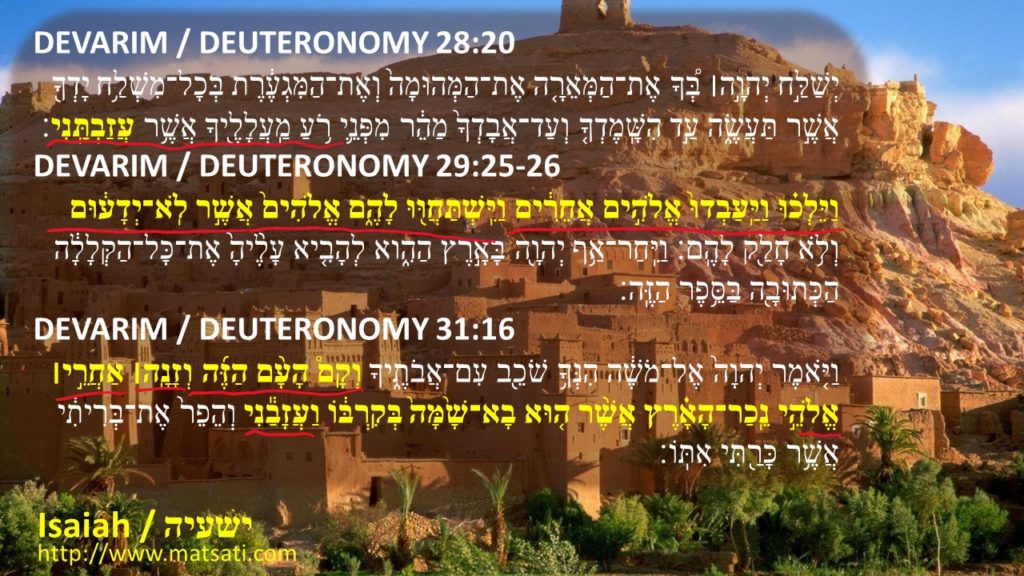
Devarim / Deuteronomy 28:20
יְשַׁלַּ֣ח יְהוָ֣ה׀ בְּ֠ךָ אֶת־הַמְּאֵרָ֤ה אֶת־הַמְּהוּמָה֙ וְאֶת־הַמִּגְעֶ֔רֶת בְּכָל־מִשְׁלַ֥ח יָדְךָ֖ אֲשֶׁ֣ר תַּעֲשֶׂ֑ה עַ֣ד הִשָּֽׁמֶדְךָ֤ וְעַד־אֲבָדְךָ֙ מַהֵ֔ר מִפְּנֵ֛י רֹ֥עַ מַֽעֲלָלֶ֖יךָ אֲשֶׁ֥ר עֲזַבְתָּֽנִי׃
Devarim / Deuteronomy 29:25-26
וַיֵּלְכ֗וּ וַיַּֽעַבְדוּ֙ אֱלֹהִ֣ים אֲחֵרִ֔ים וַיִּֽשְׁתַּחֲוּ֖וּ לָהֶ֑ם אֱלֹהִים֙ אֲשֶׁ֣ר לֹֽא־יְדָע֔וּם וְלֹ֥א חָלַ֖ק לָהֶֽם׃ וַיִּֽחַר־אַ֥ף יְהוָ֖ה בָּאָ֣רֶץ הַהִ֑וא לְהָבִ֤יא עָלֶ֙יהָ֙ אֶת־כָּל־הַקְּלָלָ֔ה הַכְּתוּבָ֖ה בַּסֵּ֥פֶר הַזֶּֽה׃
Devarim / Deuteronomy 31:16
וַיֹּ֤אמֶר יְהוָה֙ אֶל־מֹשֶׁ֔ה הִנְּךָ֥ שֹׁכֵ֖ב עִם־אֲבֹתֶ֑יךָ וְקָם֩ הָעָ֨ם הַזֶּ֜ה וְזָנָ֣ה׀ אַחֲרֵ֣י׀ אֱלֹהֵ֣י נֵֽכַר־הָאָ֗רֶץ אֲשֶׁ֨ר ה֤וּא בָא־שָׁ֙מָּה֙ בְּקִרְבּ֔וֹ וַעֲזָבַ֕נִי וְהֵפֵר֙ אֶת־בְּרִיתִ֔י אֲשֶׁ֥ר כָּרַ֖תִּי אִתּֽוֹ׃
The idea here is Israel leaving or forsaking the Lord for idols. This is how Isaiah understands the motivation behind Israel’s rebellion and rejection of the Lord God of Israel. In the middle east, it was common to mix the gods of the local regions with faith in the God of Israel. The purpose was to be able to manipulate one’s own destiny through spiritual means, which was an affront to God. When taking this approach, mingling faith with אֱלֹהִ֣ים אֲחֵרִ֔ים other gods, one may have had the false impression of remaining faithful to God in heaven. This nonetheless is an abandonment of the truth and purity of the faith, and a direct violation of the Torah command.
Isaiah goes on to say, עַל-מֶה תֻכּוּ עוֹד תּוֹסִיפוּ סָרָה כָּל-רֹאשׁ לָחֳלִי וְכָל-לֵבָב דַּוָּי: “Why should ye be stricken any more? (עַל-מֶה תֻכּוּ עוֹד תּוֹסִיפוּ) ye will revolt (סָרָה) more and more: the whole head is sick (כָּל-רֹאשׁ לָחֳלִי), and the whole heart faint (וְכָל-לֵבָב דַּוָּי).” And, מִכַּף-רֶגֶל וְעַד-רֹאשׁ אֵין-בּוֹ מְתֹם פֶּצַע וְחַבּוּרָה וּמַכָּה טְרִיָּה לֹא-זֹרוּ וְלֹא חֻבָּשׁוּ וְ רֻכְּכָה בַּשָּׁמֶןלֹא “From the sole of the foot (מִכַּף-רֶגֶל) even unto the head (וְעַד-רֹאשׁ) there is no soundness in it (אֵין-בּוֹ מְתֹם); but wounds, and bruises, and putrefying sores: they have not been closed (פֶּצַע וְחַבּוּרָה וּמַכָּה טְרִיָּה לֹא-זֹרוּ), neither bound up (לֹא חֻבָּשׁוּ), neither mollified with ointment (וְ רֻכְּכָה בַּשָּׁמֶןלֹא).” We note how having a double mind, to serve idols, comes from a sickness of the mental faculties of the mind, a lack of soundness. When studying the Torah, for example from Devarim / Deuteronomy 27-30, we note what is written, the people are split to recite the covenant on mount Ebal and Gerezim, and Moshe lists the curses for disobedience, and the blessings for obedience to God’s commands. He goes on concerning the renewing of the covenant, and prosperity for turning from sin and relying upon the Lord, and ultimately the decision to either serve God or to serve אֱלֹהִ֣ים אֲחֵרִ֔ים other gods, to choose life as opposed to death! We notice how Isaiah draws something out here that goes beyond simply the black and white letters of the Torah regarding obedience vs disobedience. Here Isaiah is speaking of something that happens fundamentally on the inside, in the mind, that leads to an inability to understand truth. The idea is the body is rotting, “From the sole of the foot (מִכַּף-רֶגֶל) even unto the head (וְעַד-רֹאשׁ) there is no soundness in it (אֵין-בּוֹ מְתֹם); but wounds, and bruises, and putrefying sores: they have not been closed (פֶּצַע וְחַבּוּרָה וּמַכָּה טְרִיָּה לֹא-זֹרוּ)” providing the imagery of seeping sores which makes a person unclean and unfit for drawing near to the Lord in His Holy Tabernacle. (Vayikra / Leviticus 13) Being healthy is the normal state of the body, and sin can make the body not just mentally unstable, but also manifest physically in illness and death. In the case of open sores, sickness, and wounds, these are obvious signs that something is wrong, however if sin is leading to mental illness, one may not be aware of the illness and sickness leading to a lifestyle of sin even (i.e. LGBTQ).
Isaiah draws out the war that is taking place in Israel saying, אַרְצְכֶם שְׁמָמָה עָרֵיכֶם שְֹרֻפוֹת אֵשׁ אַדְמַתְכֶם לְנֶגְדְּכֶם זָרִים אֹכְלִים אֹתָהּ וּשְׁמָמָה כְּמַהְפֵּכַת זָרִים “Your country is desolate (אַרְצְכֶם שְׁמָמָה), your cities are burned with fire (עָרֵיכֶם שְֹרֻפוֹת אֵשׁ): your land (אַדְמַתְכֶם), strangers devour it in your presence (לְנֶגְדְּכֶם זָרִים אֹכְלִים), and it is desolate (וּשְׁמָמָה), as overthrown by strangers (כְּמַהְפֵּכַת זָרִים).” He describes zion saying, וְנוֹתְרָה בַת-צִיּוֹן כְּסֻכָּה בְכָרֶם כִּמְלוּנָה בְמִקְשָׁה כְּעִיר נְצוּרָה “And the daughter of Zion (וְנוֹתְרָה בַת-צִיּוֹן) is left as a cottage in a vineyard (כְּסֻכָּה בְכָרֶם), as a lodge in a garden of cucumbers (כִּמְלוּנָה בְמִקְשָׁה), as a besieged city (כְּעִיר נְצוּרָה).” The final state of Israel is being left utterly desolate, לוּלֵי יְהֹוָה צְבָאוֹת הוֹתִיר לָנוּ שָֹרִיד כִּמְעָט כִּסְדֹם הָיִינוּ לַעֲמֹרָה דָּמִינוּ “Except the LORD of hosts (לוּלֵי יְהֹוָה צְבָא֔וֹת) had left unto us a very small remnant (הוֹתִיר לָנוּ שָֹרִיד), we should have been as Sodom (כִּסְדֹם הָיִינוּ), and we should have been like unto Gomorrah (לַעֲמֹרָה דָּמִינוּ).” Notice how Isaiah draws in the Torah context, it is not simply a matter of being wounded due to foreign wars, but utter destruction illustrated by Sodom and Gomorrah. We note again how this is a matter of the people’s choice, as these things come due to their rebellion and rejection of the ways of God. The political, social, societal, and physical catastrophes they are experiencing are the natural outcome of choosing to live in a way that is contrary to the ways of God. The extent of desolation is a function of the length of time one has chosen to turn from the ways of the Lord. We note 1 Peter 3:9 The Lord is not slack concerning his promise, as some men count slackness; but is longsuffering to us-ward, not willing that any should perish, but that all should come to repentance. (KJV) This patience of the Lord should not be neglected with continued sin. Isaiah is speaking here of the connection between the spirit realm and the physical one, how if we live in rebellion, we will experience the destructive result of our behavior and rebellion in our lives. God’s response to sin is always consistent, throughout the entirety of the Scriptures. Clearly according to Isaiah, God could make his people like Sodom and Gomorrah, extinct. The fact is that He has not, and this is due to His mercy and grace! The Lord always spares a remnant of peoples.

תרגום יונתן בן עוזיאל אל ישעיה פרק א:ד-ט
לָא מִסתַכְלִין לְמֵימַר עַל מָא לְקֵינָא עֹוד מֹוסְפִין לְמִחטֵי לָא אָמְרִין מָדֵין כָל רֵיש מְרַע וְכָל לֵב דָוֵי׃ מִשְאָר עַמָא וְעַד רָשַיָא לֵית בְהֹון דִשלִים בְדַחלְתִי כוּלְהֹון סָרָבִין וּמָרָדִין אִתגָעַלוּ בְחֹובִין כְמַחָא מְרָסְסָא לָא שָבְקִין מִזְדֹונְהֹון וְלָא מְחַמְדִין לִתיוּבָא וְאַף לָא זָכְוָן לְהֹון לְאַגָנָא עְלֵיהֹון׃ אֲרַעכֹון צָדיָא קִרוֵיכֹון יְקֵידַת נוּר אֲרַעכֹון לְקִבלְכֹון עַמְמַיָא מַחסְנִין יָתַה וּבחֹובֵיכֹון צַדִיאַת מִנְכֹון אִתחַלַפַת וַהְוָת לְנוּכרָאִין׃ וַאִשתְאַרַת כְנִשתָא דְצִיֹון כִמטַלְתָא בְכַרמָא בָתַר דְקַטפוּהִי כְעַרסַל מְבָתוּתַא בִמקַטיָא בָתַר דַאְבַעיוּהִי כְקַרתָא דְצָיְרִין עְלַה׃ אִילוּ לָא פֹון מֹותַר טוּבֵיה דַיוי צְבָאֹות אַשאַר לַנָא שֵיזָבָא כְרַחֲמֹוהִי אִית עִימַנָא חֹובִין דִכאְנָש סְדֹום פֹון אְבַדנָא וּכיָתְבֵי עְמֹרָה אִשתֵיצִינָא׃ קַבִילוּ פִתגָמָא דַיוי שִלטֹונַיָא דְעֹובָדֵיהֹון בִישִין כְשִלטֹונֵי סְדֹום אַצִיתוּ לְאֹורָיתָא דַאְלָהַנָא עַמָא דְעֹובָדֵיהֹון דָמַן לְעַם עְמֹורָה׃
Targum Jonathan ben Uziel on Isaiah Chapter 1:4-9
1:4 Woe to those who are called a holy people, because they have sinned; a chosen congregation, but they have multiplied sins; they are surnamed a beloved seed, but they have done evil; they are called beloved sons, but they have corrupted their paths; they have forsaken the worship of the Lord; they abhorred the fear of the Holy Oné of Israel, and because their works are evil they are turned away, and they are turned back. 1:5 They do not consider so as to say, Wherefore has He smitten us? They continue in sin; they do not say, Why is all the head sick, and the whole heart faint? 1:6 From the lowest of my people even unto the chief of them, there is not one amongst them who is perfect in my fear: all of them are disobedient and rebellious; they are polluted with sins, they are like an ulcerous wound; they have not forsaken their pride, neither long for repentance; they have also no righteousness to protect them. 1:7 Your land is desolate, your cities each burnt with fire; in your presence the nations possess it. On account of their sins it is laid desolate: from you it is transferred, and it belongs to aliens. 1:8 The congregation of Zion is left as a booth in a vineyard after they have gathered the grapes; as a lodge for passing the night in, in a garden of cucumbers after they have gleaned it; as a city against which they lay siege. 1:9 Except the exceeding goodness of the Lord of hosts had caused to remain unto us in His mercy a deliverance, we had sins, on account of which we certainly had perished as the men of Sodom, and as the inhabitants of Gomorrah we would have been consumed.
Rabbinic Literature
Isaiah 1:4 states the following, “Ah (הוֹי) sinful nation, a people laden with iniquity (גּוֹי חֹטֵא עַם כֶּבֶד עָוֹן), a seed of evildoers (זֶרַע מְרֵעִים), children that are corrupters (בָּנִים מַשְׁחִיתִים): they have forsaken the Lord (עָזְבוּ אֶת-יְהֹוָה), they have provoked the Holy One of Israel unto anger (נִאֲצוּ אֶת-קְדוֹשׁ יִשְֹרָאֵל), they are gone away backward. (נָזֹרוּ אָחוֹר)” Here Isaiah speaks of the people being heavy (כֶּבֶד) with iniquity, a seed of evil, and corrupters. This means that they are not just sinful and corrupt, but that they also corrupt others. The extent of their sinfulness is having forsaken God and causing others to forsake the Lord too. Rabbi Meir has the following to say according to the Talmud Bavli Kiddush in 36a.

Talmud Bavli Kiddushin 36a:12 on Isaiah 1:4
And Rabbi Meir says: Either way you are still called sons, as it is stated: “They are foolish sons” (Jeremiah 4:22). And it also states: “Sons in whom there is no faithfulness” (Deuteronomy 32:20). And it states: “A seed of evildoers, sons who deal corruptly” (Isaiah 1:4). And it states: “And it shall come to pass that, instead of what was said to them: You are not My people, it shall be said to them: Sons of the living God” (Hosea 2:1).
The talmudic passage speaks of Rabbi Meir in regard to being a son. Even though the people are foolish, unfaithful, evildoers, and corrupt, they remain sons. The judgment over Israel was about to be fulfilled, but yet the Lord still extended His mercy to Judah. The rabbinic literature draws out the following points concerning the Isaiah description of their sins.
Ibn Ezra on Isaiah 1:4 Part 2
כֶבֶד Laden with. An adjective in the construct state; comp. עֶרֶל לב ועֶרֶל בשר, uncircumcised in heart and uncircumcised in flesh (Ez. 44:9).כֶּבֶד is, according to Ibn Ezra, not a substantive, the burden of, but the construct state of the adjective כָּבֵד, heavy of, heavy with regard to; like עֶרֶל uncircumcised with regard to—the construct state of the adjective עָרֵל, uncircumcised.
Rashi on Isaiah 1:4 Part 1
Woe Every instance of הוֹי in Scripture is an expression of complaining and lamenting, like a person who sighs from his heart and cries, “Alas!” There are, however, several, which are an expression of a cry, the vocative voice, e.g., “Ho, ho, flee from the land of the north” (Zech. 2:10), which the Targum renders, אַכְלוּ, an expression of announcing. Woe There is a reason to cry about a holy nation that turned into a sinful nation, and a people referred to by the expression, “for you are a holy people” (Deut. 7:6), turned into a people with iniquity.
Rashi on Isaiah 1:4 Part 2
a people heavy with iniquity The heaviness of iniquity. The word denotes a person who is heavy, peasant in French, ponderous. The word כֶבֶד is a substantive of heaviness, pesantoma in French, and is in the construct state, and is connected with the word עָוֹן, iniquity.
Ibn Ezra looks at the word כֶבֶד which means “heavy, great, massive, abundant, numerous.” This description is analogous to the phrase, עֶרֶל לב ועֶרֶל בשר, uncircumcised in heart and uncircumcised in flesh, according to Ezekiel 44:9. Rashi draws out the contrast between those who are a holy people (Devarim / Deuteronomy 7:6) and those who have turned into a people of iniquity. Their iniquity is very weighty (כֶבֶד) so as to require the abundant mercy of God. Thankfully for us, we have a loving and merciful God. This is the meaning of the phrase “rich in mercy” which is found in Ephesians 2:4. If we consider the passage from Ephesians, consider what Isaiah is saying in light of the condition Paul describes believers before they came to the Messiah in faith and then their state following having received the Messiah by responding to the call of God.

Ephesians 2:1–7
2:1 And you were dead in your trespasses and sins, 2:2 in which you formerly walked according to the course of this world, according to the prince of the power of the air, of the spirit that is now working in the sons of disobedience. 2:3 Among them we too all formerly lived in the lusts of our flesh, indulging the desires of the flesh and of the mind, and were by nature children of wrath, even as the rest. 2:4 But God, being rich in mercy, because of His great love with which He loved us, 2:5 even when we were dead in our transgressions, made us alive together with Christ (by grace you have been saved), 2:6 and raised us up with Him, and seated us with Him in the heavenly places in Christ Jesus, 2:7 so that in the ages to come He might show the surpassing riches of His grace in kindness toward us in Christ Jesus. (NASB)
In Ephesians Paul describes man’s condition as being in a state of rebellion, and God’s abundant mercy. Paul’s words are quite similar to what we are reading here in Isaiah 1:4. Paul speaks of the spiritual forces that are at work (2:2), our current status is in the Messiah (Christ), but formerly we walked in the way of this world (דרך העולם), and according to the prince of the power of the air and the spirit that is working in the sons of disobedience. Paul draws in this spiritual aspect of the one who does not know God or Yeshua. The course of this world is diametrically opposed to the way of God (דרך השם) which is why the Torah describes God as distinctively moral. Thus, to act immorally is an affront to him, and to forsake him is to be doomed to act Immorally and to die in sin. These things are all connected, sexual immorality, adultery, and idolatry! Note how Targum Jonathan interprets these things saying, מִשְאָר עַמָא וְעַד רָשַיָא לֵית בְהֹון דִשלִים בְדַחלְתִי כוּלְהֹון סָרָבִין וּמָרָדִין אִתגָעַלוּ בְחֹובִין כְמַחָא מְרָסְסָא לָא שָבְקִין מִזְדֹונְהֹון וְלָא מְחַמְדִין לִתיוּבָא וְאַף לָא זָכְוָן לְהֹון לְאַגָנָא עְלֵיהֹון׃ 1:6 From the lowest of my people even unto the chief of them, there is not one amongst them who is perfect in my fear: all of them are disobedient and rebellious; they are polluted with sins, they are like an ulcerous wound; they have not forsaken their pride, neither long for repentance; they have also no righteousness to protect them. (Targum) This is how Paul understood being “dead” in sin as without the living God in our lives, we do not have life. (Romans 6:23) Because of our sins, we deserve the wrath of God since we can do nothing to save ourselves! Coming to this realization helps us to understand the significance of what Yeshua did on our behalf. The Targum uses the words וְאַף לָא זָכְוָן saying that they do not have “justice, law, good deed, act of salvation” to protect them. This draws out a very good point in regards to what we have in Yeshua, we have righteousness that protects and saves! Paul writes 2:4 But God, being rich in mercy, because of His great love with which He loved us, 2:5 even when we were dead in our transgressions, made us alive together with Christ (by grace you have been saved), (NASB) describing the richness of the mercy of God. It is only within the confines of God’s great wisdom, compassion, and mercy, that the plan to save and redeem such a wicked people could be conceived. The mercy of God is forgiveness that is extended to those who deserve punishment. The mercy of the Almighty God in heaven, our Father in heaven, is the only explanation for Yeshua’s great sacrifice on our behalf. Note how in this world, men are able to show mercy on a limited basis. When comparing this to our sins before a Holy God, as the Targum states, 1:7 Your land is desolate, your cities each burnt with fire; in your presence the nations possess it. On account of their sins it is laid desolate: from you it is transferred, and it belongs to aliens. (Targum) Our sins lay waste and enable the enemy to come and destroy all that we have. This description reveals to us the unforgivable nature of ungodliness, as taking root in the phrase עָזְבוּ אֶת-יְהֹוָה “they have forsaken the Lord.” These things reveal to us the level of mercy God has shown Him to be more than merciful, He is rich in mercy because of His great love for us! (2:4) This is why Paul wrote saying how this “demonstrates his own love for us in this: While we were still sinners, Christ died for us” (Romans 5:8). The apostle Peter also wrote, 1 Peter 1:3 counters any tendency to believe that our salvation is due to some merit within ourselves: “Praise be to the God and Father of our Lord Jesus Christ! In his great mercy he has given us new birth into a living hope through the resurrection of Jesus Christ from the dead.” We note that God’s mercies continue after salvation as He offers His redeemed children forgiveness when we sin (1 John 1:9). Because He is rich in mercy, His mercies never end. They are “new every morning” (Lamentations 3:23). We never have to fear that one day God will get fed up and stop His patience working in our lives (2 Peter 3:9). We never need to worry that we have “used up” our portion of grace and kindness because our God is rich in mercy. This is how Rabbi Mier understood the mercy of God according to the Talmud, as remaining sons in the midst of our failures. Even though they are foolish, unfaithful, evildoers, and corrupt, we remain sons. But not just this, believing upon Yeshua, we receive the Holy Spirit of God which transforms us and empowers us so that we do not walk in sin any more.
The other interesting comments from the rabbis come from Isaiah 1:6 and 1:9. Isaiah 1:6 states, And, מִכַּף-רֶגֶל וְעַד-רֹאשׁ אֵין-בּוֹ מְתֹם פֶּצַע וְחַבּוּרָה וּמַכָּה טְרִיָּה לֹא-זֹרוּ וְלֹא חֻבָּשׁוּ וְ רֻכְּכָה בַּשָּׁמֶןלֹא “From the sole of the foot (מִכַּף-רֶגֶל) even unto the head (וְעַד-רֹאשׁ) there is no soundness in it (אֵין-בּוֹ מְתֹם); but wounds, and bruises, and putrefying sores: they have not been closed (פֶּצַע וְחַבּוּרָה וּמַכָּה טְרִיָּה לֹא-זֹרוּ), neither bound up (לֹא חֻבָּשׁוּ), neither mollified with ointment (וְ רֻכְּכָה בַּשָּׁמֶןלֹא).”
Rashi on Isaiah 1:6 Part 7
neither was it softened with oil Their wound was not softened with oil, as is customary with other wounds. It would be inappropriate to say here, “They were not softened with oil,” for they soften only the place of the sore, not the wound and the contusion but the sprinkling and the bandaging applies to all three, [i.e., the wound, the contusion, and the lacerated sore.] Therefore, the plural number applies to them; the lesions were not sprinkled and not bandaged. Jonathan interprets the entire verse figuratively, referring to the fact that they were soiled and afflicted with iniquity. Accordingly, he rendered, “From the sole of the foot until the head,” from the smallest to the greatest, there is no soundness. There is none good among them, wounds and contusions, rebellious deeds, iniquities, and inadvertent sins. they have not been sprinkled… i.e., they have not been healed by repenting wholeheartedly, nor has it been softened with oil, not even a trace of repentant thought has entered their heart.
It is interesting what Rashi is drawing out here in his interpretation “neither mollified with ointment/oil” (וְרֻכְּכָה בַּשָּׁמֶןלֹא), that the sprinkling with oil was only on the wound, the sore, the contusion. The issue here is a matter of only treating the symptom as opposed to actually treating the source. We all desperately need this healing, yet our own hearts are the source of the trouble. (Matthew 15:19-20, 19 “For out of the heart come evil thoughts, murders, acts of adultery, other immoral sexual acts, thefts, false testimonies, and slanderous statements.” 20 “These are the things that defile the person; but to eat with unwashed hands does not defile the person.”) Rashi says that Targum emphasizes the entirety of their sin, as being from head to toe with sin and rebellion. The New Testament teaches that Yeshua came to die “for our sins,” to heal us from the plague of death. (see Hebrews 7:27, 9:26, 1 John 3:5) Our sin separates us from God, but Messiah’s sacrifice draws us near (Hebrews 7:19). Yeshua is our Goel (i.e., גּאֵל, Redeemer) who paid the price so that we would not experience the curse of the law (Galatians 3:13). The point source of sin is an internal one, the location of that which is corrupt is our hearts, this requires us to be transformed from the inside out. The author of Hebrews wrote, “For the law made nothing perfect, but on the other hand, a better hope is introduced, and that is how we draw near (karov) to God” ( Hebrews 7:19 ). This better how is having a righteousness that is given to us by God, a righteousness that saves! This is how Isaiah opens in 1:9 with “Except the LORD of hosts” (לוּלֵי יְהֹוָה צְבָא֔וֹת) indicating the directionality of our help, it is not within ourselves, but within God alone! Isaiah 1:9 states, לוּלֵי יְהֹוָה צְבָאוֹת הוֹתִיר לָנוּ שָֹרִיד כִּמְעָט כִּסְדֹם הָיִינוּ לַעֲמֹרָה דָּמִינוּ “Except the LORD of hosts (לוּלֵי יְהֹוָה צְבָא֔וֹת) had left unto us a very small remnant (הוֹתִיר לָנוּ שָֹרִיד), we should have been as Sodom (כִּסְדֹם הָיִינוּ), and we should have been like unto Gomorrah (לַעֲמֹרָה דָּמִינוּ).” The rabbis comment on this in the following way.

Talmud Bavli Berakhot 19a:21 on Isaiah 1:9
And Rav Yosef said: What is the verse from which it is derived? As it is stated: “We should have almost been as Sodom, we should have been like unto Gomorrah” (Isaiah 1:9), after which what did the prophet reply to them? “Hear the word of the Lord, rulers of Sodom; give ear unto the law of our God, people of Gomorrah” (Isaiah 1:10).
Rashi on Isaiah 1:9 Part 1
Had not the Lord of Hosts left us a remnant by His own volition and with His mercy, not because of our merits.
The rabbis of the Talmud, Rav Yosef specifically, makes an appeal to Israel giving ear to God’s Torah. This reminds us of Shemot / Exodus 15:26.
ספר שמות פרק טו
וַיֹּאמֶר֩ אִם־שָׁמ֨וֹעַ תִּשְׁמַ֜ע לְק֣וֹל׀ יְהוָ֣ה אֱלֹהֶ֗יךָ וְהַיָּשָׁ֤ר בְּעֵינָיו֙ תַּעֲשֶׂ֔ה וְהַֽאֲזַנְתָּ֙ לְמִצְוֺתָ֔יו וְשָׁמַרְתָּ֖ כָּל־חֻקָּ֑יו כָּֽל־הַמַּֽחֲלָ֞ה אֲשֶׁר־שַׂ֤מְתִּי בְמִצְרַ֙יִם֙ לֹא־אָשִׂ֣ים עָלֶ֔יךָ כִּ֛י אֲנִ֥י יְהוָ֖ה רֹפְאֶֽךָ׃
Shemot / Exodus 15:26
15:26And He said, “If you will listen carefully to the voice of the LORD your God, and do what is right in His sight, and listen to His commandments, and keep all His statutes, I will put none of the diseases on you which I have put on the Egyptians; for I, the LORD, am your healer.” (NASB)
The question is however, who can hear, who can listen, without the help of God? We note this principle is drawn out from the beginning of the Scriptures, as The very first sacrifice of the Torah was offered by God Himself, when He slaughtered an animal to cover the sin and shame of Adam and Eve. (Bereshit / Genesis 3:21) As we read on in the Torah, we know that Adam taught his sons about the Torat (instruction) of sacrifice when we read how Cain’s offering (מִנְחָה) was rejected because it came from the fruit of the earth that was cursed, whereas Abel’s was accepted because it was based on blood sacrifice (Bereshit / Genesis 4:3-5). Jewish theology following the destruction of the Second Temple(post-Temple Judaism) has attempted to explain the significance of the sacrificial system apart from sacrifice, reformulating Torah Judaism away from the Temple service and towards the synagogue. Note that the medieval Rabbi Maimonides stated that the sacrifices were “chukkim” (decrees) that were intended to be offered as a sign of devotion to God. Later he said that they were given as a concession to man’s weakness, since the rituals made it easier for people to tangibly approach the infinite God, and God “allowed” for them sacrifices to keep them away from idolatry (Vayikra / Leviticus 17:5-7). The Baal Hachinuch said that the sacrificial system was intended to teach the need for teshuvah (repentance). He argued that man’s distinctive attribute is his ability to reason, that is, his ability to think, use language, and make ethical decisions. These unique qualities demonstrate how man was made in the image of God. This sets man apart from the animal world. When a person sins, however, it is a failure of reason, and this implies the forfeiture or desecration of the image of God. This means sin is a base form of living, a form of “animal” behavior, based on lusts, unrestrained desires, and the lack of reflective thought, and thus the sacrifice of an animal is intended to reveal the end result of a “reasonless being.” Witnessing the destruction of the animal is intended to warn against sin and its destructive irrationality. All of these things are drawn out from the words of Isaiah to Israel, to turn from sin, to humble themselves, to draw near to God, to seek His forgiveness, and have faith in the one true God! All of these things have much application for our lives as we live in a world containing all sorts of evils, ungodliness, lusts, foolishness, corruption, etc.
